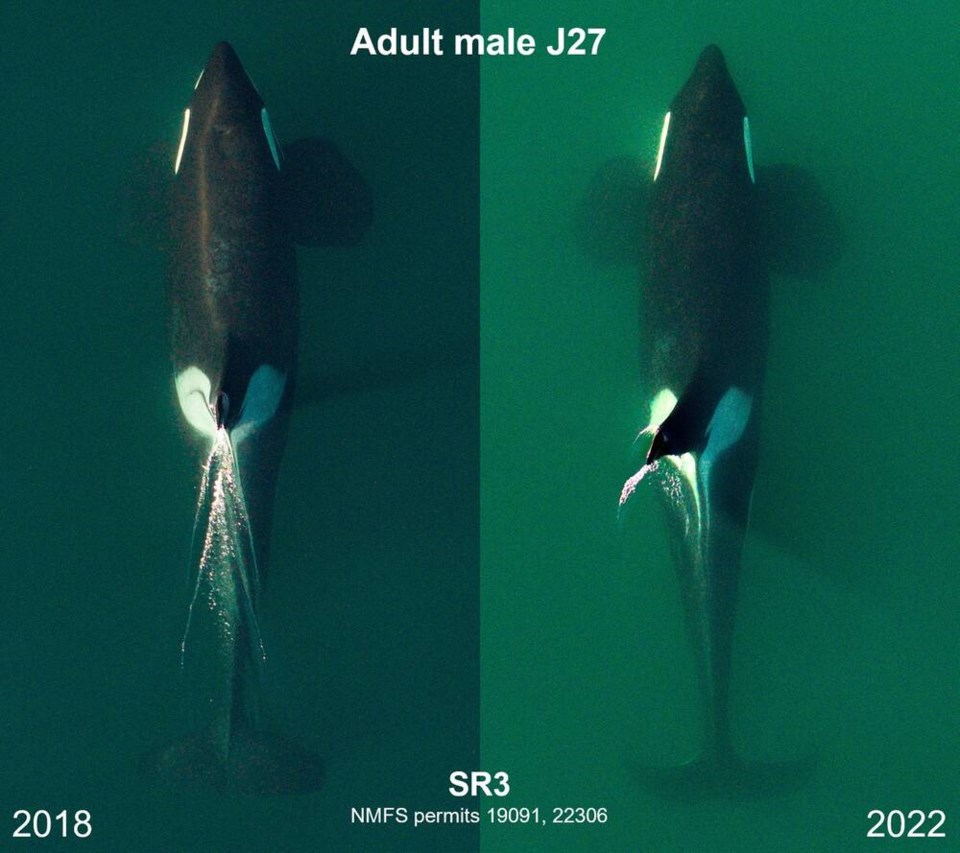At least 13 southern resident killer whales are in poor condition, according to Washington researchers.
The news comes from the Washington Department of Fish & Wildlife (WDFW), which noted several pregnancies among the whale population, alongside those in poor condition, in research conducted between September 2021 and April 2022.
SR3 Sealife Response Rehabilitation and Research used measurements from drone photographs and found 13 J- and L-pod members to be in poor condition based on measurements of fatness behind the skull. The reduced fat puts them at a two to three time higher risk of mortality.
One photo shows adult male J27 with a slimmer profile and lopsided dorsal fin compared to a 2018 shot. Two young whales — J53 and L123 — were found to be exhibiting slower-than-expected growth. J53 was also exhibiting a lower-than-average body condition.
At least three K-pod whales were believed to be in the last stages of pregnancy and it’s possible that one of the calves has since been born, WDFW said. Researchers also believe whale L72 is in the late stages of her 17-18-month pregnancy.
“While we have reason to remain hopeful with the reports of recent pregnancies, the reality is that there are several southern residents that aren’t doing well and we’re very concerned about the population at large,” said a statement from WDFW director Kelly Susewind. “We continue working with our partner organizations to implement the Governor’s Task Force recommendations for the long-term health of these orcas.”
Those recommendations — crafted through Washington state, federal and non-government organizations — include actions to increase salmon populations (salmon is a diet staple for the whales), restrict contaminants and limit the impacts of vessels, which create noise that interferes with echolocation, the killer whales’ hunting tool.
In Canada, the Department of Fisheries and Oceans mandates a vessel approach-distance of no closer than 400 metres for coastal waters between Campbell River and just north of Ucluelet. Year-round Marine Mammal Regulations limit vessels to 200 metres from all killer whales in the rest of the Canadian Pacific.
Simon Pidock, owner of the Campbell River-based whale watching company Ocean EcoVentures, hasn’t seen the endangered southern residents since 2019, when he and other whale watching companies signed a Transport Canada agreement to support the recovery of resident orcas. “It’s been tough not being able to view them, we really considered them our extended family. We know how to identify each one,” he said. “It’s tough not being able to educate folks and bring their plight into the limelight.
“But right now, every salmon counts.”
While the news from Washington state is discouraging, Pidcock said, it’s not surprising.
“It’s great to designate them as vulnerable, these certain whales, but in my eyes every single one of them is vulnerable and has been for the last 15 year or 20 years,” he said.
“The one good thing one could take away is hopefully it creates more energy and effort.”
Aside from vessel noise, southern resident killer whales face two other large-scale threats: contaminants in their food, and a lack of food altogether. Unlike transient orcas — which feed on seals and other pinnipeds — southern residents eat only salmon, which is in dwindling supply.
“If people want to do something, we need to make sure they have food throughout their entire range,” said Shari Tarantino, executive director of Orca Conservancy, a Washington-based non-profit.
“All of us within the orca community are still working really hard to educate people and trying to do as many restoration events as we can, to restore riparian zones and plant trees next to rivers so the salmon have cool water.”
But lobbying and government action are vital, she said.
“People need to understand that there’s a huge lack of political will due to corporate greed.”




